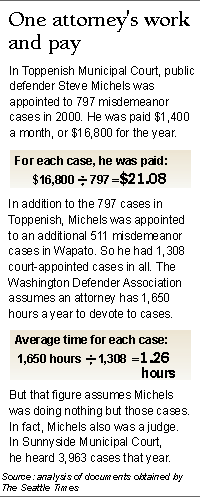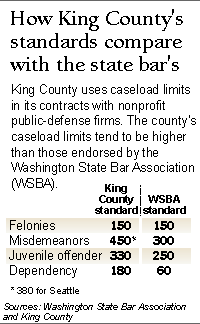 |
 |
 |
|
|
Tuesday, April 6, 2004 Page 2 of 3
Twelve times, from August 1998 until February 2001, Michels "deprived defendants of their constitutional rights by acting as both judge and defense counsel," the Washington Supreme Court wrote.
In a separate proceeding, Michels told the state bar that his confusion in these dual-role cases can be attributed, in part, to how many indigent defendants he represents. In 2000, Michels was appointed to 797 misdemeanor cases in Toppenish, and to 511 in nearby Wapato. That's 1,308 cases — more than four times the recommended limit of 300 misdemeanors a year. "Because of the number of cases involved, it is often difficult to remember each defendant," Michels wrote in a letter to the bar. The bar's recommended misdemeanor caseload limit assumes an attorney is doing nothing else. (A gross misdemeanor can carry serious consequences for a defendant: up to a year in jail.) But in the same year that he had 1,308 cases as a public defender in Toppenish and Wapato, Michels oversaw 3,963 cases as a Municipal Court judge in Sunnyside, according to state records. This was in addition to the cases he heard as a substitute judge in Toppenish. And this was in addition to his private practice. Now, some math: Assume an attorney has 1,650 hours a year to devote to his casework. (That's the number used by the Washington Defender Association, which provides training and support for public defenders statewide.) With 1,308 court-appointed clients, Michels would have had only 1.26 hours to devote to each case. And that assumes he was doing nothing else — with Michels, a fanciful assumption. Another way to look at it: Toppenish used to pay Michels $75 per case for court-appointed work. But in the 1990s, it switched to a fixed-fee contract. In 2000, Michels' contract with Toppenish paid $1,400 a month, according to the city's clerk-treasurer. With 797 court-appointed cases in Toppenish that year, Michels' pay comes out to $21.08 per case. A person can spend more on a good haircut.
RUNAWAY JUVENILE CASELOADS
The Juvenile Court caseload that finally proved too much for Lisa Tabbut is not an exception. Statewide, court records and studies have consistently revealed especially burdensome public-defense caseloads in Juvenile Court, where dependency and juvenile-offender cases are handled. In dependency cases, the burden is compounded by a disparity in resources. With felonies, misdemeanors and even juvenile-offender cases, a court-appointed defense attorney typically faces a prosecutor who also is paid by the county. But in dependency cases, attorneys representing parents accused of abusing or neglecting their children face two vast state agencies: the Department of Social and Health Services (DSHS), which investigates complaints against parents, and the state Attorney General's Office, which argues DSHS claims. A 1999 report by the Washington State Office of Public Defense found that the Attorney General's budget for such cases was twice what counties typically spend in defense of parents. The report also noted that DSHS has "massive" resources, with more than 1,200 employees who work on dependency cases statewide. Opposite that place a public defender like Tabbut, trying to do justice in nearly 300 dependency cases while defending hundreds of other court-appointed clients. "It is hugely overwhelming," Tabbut says. To address the imbalance in dependency cases, the state is funding a pilot program in Pierce, Benton and Franklin counties that allows attorneys to limit caseloads to 90 a year and have greater access to investigators and experts. Court commissioners have praised the results, saying attorneys are better prepared and have more time to communicate with clients. Runaway caseloads have also been a chronic problem in juvenile-offender cases. In Snohomish County, for example, state data shows that one public-defense attorney averaged 723 cases a year from 1998 to 2002. That nearly triples the limit of 250 recommended by the state bar. The American Bar Association Juvenile Justice Center, in collaboration with other groups, issued a report last October documenting Washington's struggles to provide adequate representation in juvenile-offender cases. Researchers interviewed about 30 public defenders, in seven counties, who reported carrying 360 to 750 cases a year. In Juvenile Court, the study found, some attorneys seem more concerned with fostering good relationships with judges and prosecutors than with defending their clients aggressively. Such "defenders do not set trials, bring motions, or push for investigation funds because they fear 'rocking the boat' and being ostracized by the juvenile-court community," the report said. Some juveniles interviewed as part of the study described rushed meetings with attorneys, and little time to ask questions. "(My attorney) said, 'You are going to plead guilty,' and I didn't want to," a 13-year-old boy said. "He was making me say something that wasn't true. He thought I was lying." A 16-year-old boy said of his attorney: "I wish she would at least return my message(s) and get back to me."
NO CARROT, NO STICK
Most counties have snubbed even those minimal demands. Based upon a statewide review of county ordinances, resolutions and Superior Court contracts, the American Civil Liberties Union (ACLU) of Washington recently concluded that many counties failed to honor their obligations. Fourteen of Washington's 39 counties have adopted standards on some or all topics. Of those, only King County has comprehensive standards that include numerical limits on attorney caseloads, the report says. Twenty-five counties have not adopted any standards at all, the study says. For counties that violate the law, there's no punishment. For counties that follow the law, there's no reward. That wasn't the original intent.
|
|
||||||||||||
seattletimes.com home
Home delivery
| Contact us
| Search archive
| Site map
| Low-graphic
NWclassifieds
| NWsource
| Advertising info
| The Seattle Times Company


